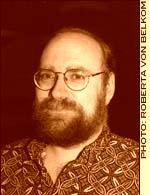Robert Charles Wilson
(1953 --)

Robert Charles Wilson
(1953 --)

A note: Do not confuse this author
with other almost 70 sci-fi writers named Wilson. Please, this Robert Charles
Wilson is not Charles Wilson or four other Robert Wilsons, and he is also
not the American writer named Robert Charles Wilson who wrote The Crooked
Tree and Icefire (the latter is, therefore, often cited as Robert
C. Wilson).
"By almost any definition,
of course, the conversion of Europe was a miracle, unanticipated, unexplained,
and apparently well beyond the scope of natural law.
But was it?
This miracle, Guilford thought,
had no signature, God had not announced it from the heavens. It had simply
happened. It was an event, presaged by strange lights and accompanied by
strange weather (tornadoes in Khartoom, he had read) and geological disturbances
(damaging earthquakes in Japan, rumors of worse in Manchuria).
For a miracle, Guilford thought,
it caused suspiciously many side effects..."
"On the other hand, what limits
applied to divine intervention? None, presumably. If the Creator of the
Universe wanted to give one of his creations the false appearance of a
history, He would simply do so; human logic was surely the least of His
concerns. God might have made the world just yesterday, for that matter,
assembled it out of stardust and divine will complete with the illusion
of human memory. Who would know? Had Caesar or Cleopatra ever really lived?"
"...But that single phrase
("the appearance of age") troubled him. It made all knowledge provisional.
The world was a stage set -- it might have been built yesterday, freshly
equipped with mountains and mastodon bones and human memories --- which
gave the Creator an unseemly interest in deceiving his human creations
and made no useful distinction between the work of time and the work of
a miracle. It seemed to Guilford unnecessarily complex -- though why, come
to think of it, should the world be simple?"
"According to their instruments, the new Rheinfelden was at roughly the location of the old European cascade, but the approximation was crude, and the white-water rapids that used to run below the falls were either absent or burried under a deeper, slower Rhine. Sullivan saw this as more evidence for a Darwinian that had evolved somehow in parallel with the old Europe, in which the ancient tumble of a single rock might have changed the course of a river, at least within certain limits. Finch put it down to the absence of human intervention: "The olf Rhine was fished, locked, navigated, and exploited for more than a thousand years. Naturally it came to follow a different course." Whereas this Europe was untouched, Edenic."
"One of those billions was
an ancient terrestrial node which had once been named Guilford Law. This
seed-consciousness, barely complex enough to retain its own ancient memory,
was launched with countless others into the Archive's fractal depths.
History's last war had begun.
Guilford Law remembered war.
It was war that had killed him, after all."
"Guilford said nothing. He felt a great fear battering at this envelope of calm which contained him. If what the picket had told him was true then this mass in the sky contained both his past and his future; time all fragile, tentative, vulnerable to attack. That smoldering cinder was a slate on which gods had written worlds. Misplace an atom and planets collide."
"What did dying mean, when the world was made of numbers?"
|
|
|
|
|
|
|